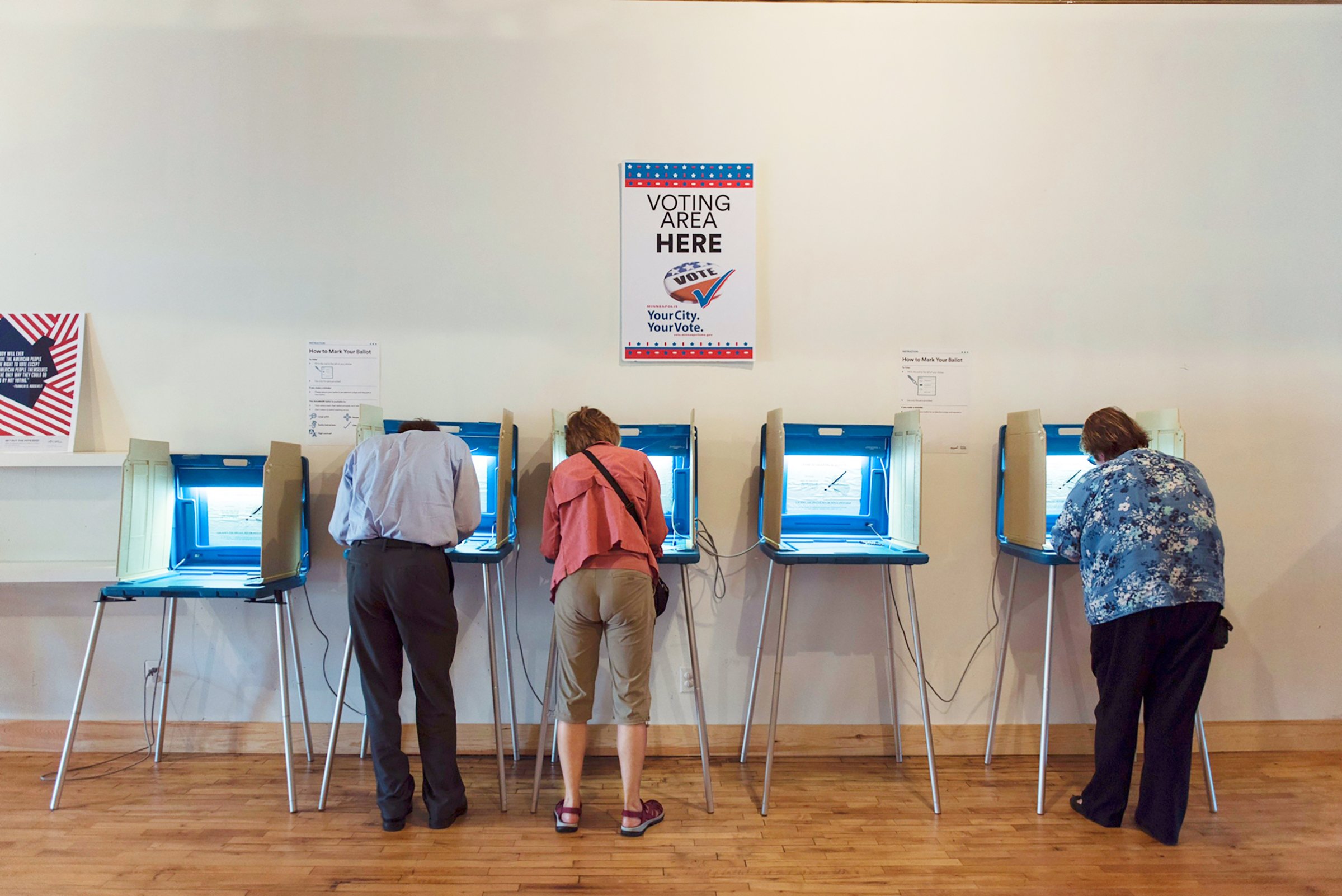
Michael Hannum knows what it’s like when Kris Kobach comes after you. Last year, the Kansas secretary of state charged Hannum, a 65-year-old retired molecular geneticist, with one felony and three misdemeanor election violations, alleging that Hannum voted in 2012 in Johnson County, Kansas, where he lived, as well as Omaha, Neb., where he visited his mother.
Hannum says he doesn’t recall voting in Nebraska. If anything, he thinks his then fiancée might have mailed an absentee ballot by mistake. But facing a bulldog prosecutor and prison time, he decided to plead guilty, paying a $5,500 fine and twice that in legal fees to resolve the matter. “It was amazing how many resources went into pursuing me,” Hannum says. “In my opinion, it was a political statement.”
His pursuer is one of the leading defenders of the Republican Party belief that voter fraud is an epidemic. Kobach’s zeal for the subject, and his defense of Donald Trump’s unfounded claim that millions of illegal votes were cast for Hillary Clinton in 2016, made him the President’s pick to spearhead a new White House commission on election integrity, which will hold its first official meeting on July 19.
The panel’s tactics have already drawn bipartisan criticism. Some states refused Kobach’s request for detailed voter data, including sensitive information like Social Security numbers, while others refused to cooperate at all. The commission plans to compare databases to study best practices and check for fraudulent registrations, then recommend ways to strengthen the system. “The goal is to catalog vulnerabilities in our election system,” says J. Christian Adams, a Republican election lawyer on the panel. “To get to the bottom of a problem with evidence and data.”
Opponents see another agenda. For years, GOP leaders have argued for election rules to safeguard elections that make it harder for people who tend to vote Democrat–especially poor minorities–to cast a ballot. The goal of Kobach’s commission, says Vanita Gupta, CEO of the Leadership Conference on Civil and Human Rights and a former head of the Justice Department’s civil rights division, “is to lay the groundwork for voter suppression.”
Since 2010, over 20 states have passed tighter voting restrictions. Under Kobach, 51, Kansas has been particularly aggressive. The Ivy League–educated lawyer and former Justice Department official has pushed through statutes requiring that residents prove citizenship in order to register and show a government-issued photo ID at the polls. (A conservative federal judge struck down some of those restrictions last year, finding they had deprived 18,000 Kansans of their rights.) Kobach, who recently announced a campaign for governor, even wrested prosecutorial powers from the state legislature to crack down on what he called an epidemic of illegal voting. In two years, he has convicted nine people for fraud. Most were older citizens with homes in two states who mistakenly voted in both.
Academic studies repeatedly show that election fraud is exceedingly rare. “The data show Americans are more likely to be struck by lightning than commit election fraud,” says Rudy Mehrbani, senior counsel at the Brennan Center for Justice at New York University School of Law. And yet widespread fraud is received wisdom for some on the right.
Election experts say the panel’s approach is likely to yield large numbers of false positives–voters flagged for possible fraud who did nothing wrong. That’s what’s happened with an interstate voter-registration directory Kobach championed in Kansas. Known as Crosscheck, it compares voter rolls in 32 states to turn up people registered in multiple places. But the system has kinks. According to a 2017 study by researchers from Stanford, Harvard and Microsoft, it could stop 200 legitimate votes for every double vote it prevents.
Voting-rights advocates, who tend to be Democrats, fear Republican lawmakers could use its findings to purge voters or pare back ballot access. “It’s about creating a narrative that the system is broken and the laws have to be changed,” says Lorraine Minnite, who studies voting rights at Rutgers University. That’s the case Trump himself has made. After the election, he tweeted angrily when the media didn’t corroborate his claims that voter fraud was pervasive. Now he’s tasked Kobach with finding the evidence.
More Must-Reads from TIME
- Donald Trump Is TIME's 2024 Person of the Year
- Why We Chose Trump as Person of the Year
- Is Intermittent Fasting Good or Bad for You?
- The 100 Must-Read Books of 2024
- The 20 Best Christmas TV Episodes
- Column: If Optimism Feels Ridiculous Now, Try Hope
- The Future of Climate Action Is Trade Policy
- Merle Bombardieri Is Helping People Make the Baby Decision
Write to Alex Altman at alex_altman@timemagazine.com